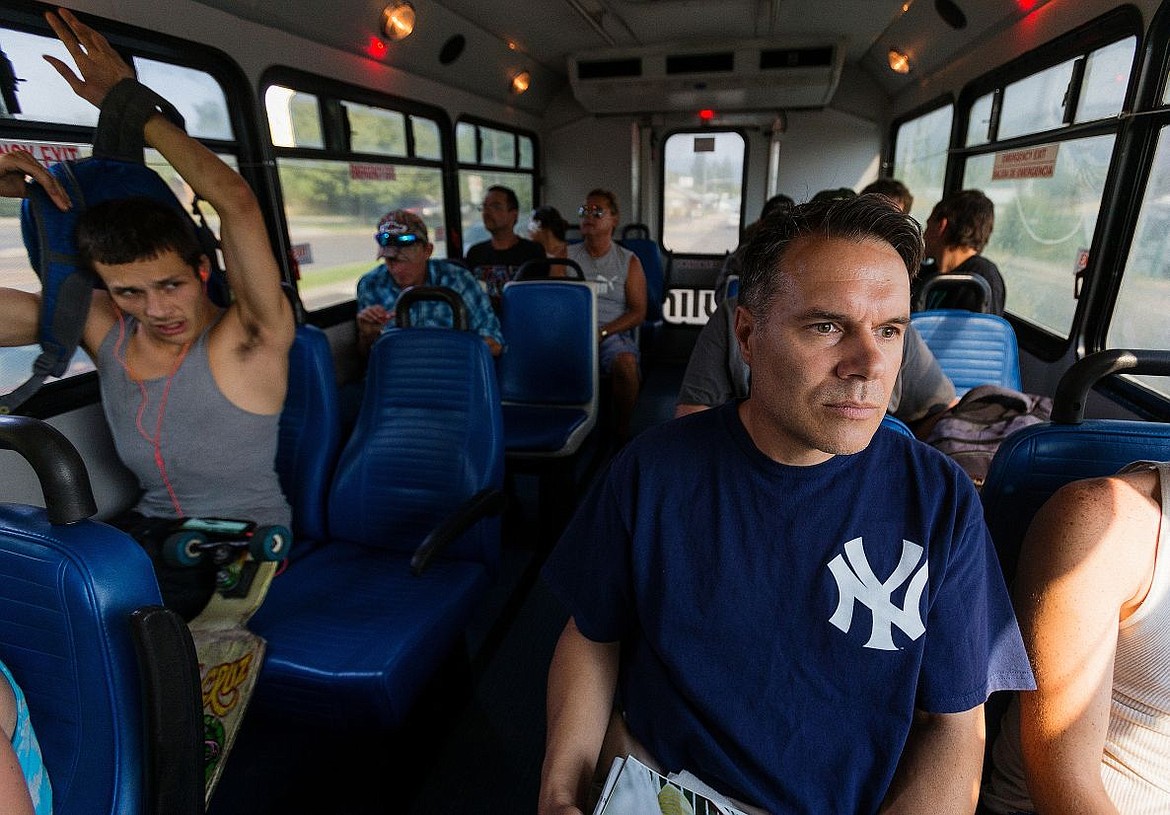Free rides to end on Citylink
COEUR d'ALENE — For the two years Lindsey Smith has been riding Citylink for free, she has found the bus transit system reliable as well as economical for her to get around.
So the Coeur d'Alene woman did a double-take when she heard about a planned cashless fare system to ride the bus.
"All good things must come to an end," Smith said while waiting at the Citylink's park-and-ride area near Riverstone in Coeur d'Alene on Friday. "I'd be really disappointed because it has made it affordable for me to get around, but yet I understand if they need to make improvements and modernize the system. How many places can you ride the bus for free, after all?"
The amount and start date of the fare haven't been determined. Citylink, a collaboration between the Coeur d'Alene Tribe and Kootenai County, started in 2005 and has offered free rides since.
"Very few systems in the United States don't have a fare," said Kimberly Hobson, program specialist for Kootenai County's Transit Office. "It's an unsustainable model (to not have a fare)."
Nationwide, transit fares on average cover 36 percent of systems' costs.
Corey Clarke, transit program specialist at the county, said fares will allow Citylink to add cameras and GPS tracking on the buses, roll out a smartphone app for riders to know when buses are coming, new radios for enhanced communication and other improvements to modernize the system.
Four public open houses will be held in late May throughout Kootenai County for people to comment on the fare and other planned changes as recommended by a study by David Evans and Associates and 650 survey responses.
Under the cashless fare system, riders would purchase cards from area retailers to ride the bus that would be charged when they get on. A cashless system, Clarke said, would make it safer for riders and drivers and is the system more systems are adopting.
"Rather than install the infrastructure for a cash system that will have to be upgraded later, it's a wise investment to go straight to cashless so it's on the cutting edge of technology," Clarke said.
Hobson said the hope is to create a safer environment with the improvements, which could lead to more riders.
"Safety is always a concern, especially in this day and age," she said.
Clarke and Hobson said they spent a week with Citylink drivers to discuss the changes, and they found very little to no resistance to the proposals.
"It was truly surprising," Hobson said.
Hobson said a discount on the passes will be determined for low-income residents.
"Our goal is to make sure everybody who needs public transportation gets it," she said.
There were 187,000 rides aboard Citylink last fiscal year. The system offers routes in Coeur d'Alene, Post Falls, Hayden, Dalton Gardens, Huetter, to the Coeur d'Alene Casino and in Benewah County.
The planned changes would affect the B (Post Falls and Huetter) and C (Coeur d'Alene-Dalton Gardens-Hayden) routes only as those are what Kootenai County has oversight over. Therefore, the Benewah County routes will not be affected by these changes. The changes will also not affect Kootenai Health's transit system.
For the current fiscal year, Kootenai County received $777,613 in federal funds for Citylink. The remaining $185,046 came from the cities where rides are offered and other cash matches. Kootenai Health and the Coeur d'Alene Tribe provide in-kind matches, which are different than cash contributions and money that is spent on related systems.
Clarke said planned changes to Citylink are not due to diminishing federal funds, but to make improvements, modernize the system and make it sustainable for years to come.
Clarke said changes to Citylink routes and stops are being evaluated. The alternating loop structure may be scrapped because it's confusing to riders.
"We may go to one way or the other (clockwise or counterclockwise) so that everybody knows what side of the street to be on," Clarke said.
Another reason for the transit study was to develop a design for the transit center that will be built at the current park-and-ride near Riverstone in Coeur d'Alene. The center won't be an indoor structure such as the one in Spokane. It will have paved parking, bus bays, covered canopies, offices, restrooms, a breakroom for drivers, bike racks and trailhead access.
"About 20 percent of the concept has been established, and the next step will be architectural drawings," Clarke said. "After that, we'll go out to bid for construction."
Clarke said it's possible construction will begin next year, but with the design still in preliminary stages, that's not for sure.
"The good news is that we do have federal funds to pay for the whole thing that we've been banking over the years," Clarke said.
Kootenai County's Transit Office has spent more than a year gathering data on possible changes to Citylink. Meetings have been held with city planners, Panhandle Health District, law enforcement, North Idaho College, the Centennial Trail Foundation, bicycle groups, the Coeur d'Alene Tribe and other organizations.
The study by David Evans cost $60,000 for the transit service analysis. It was funded 80 percent by federal grant funds and 20 percent by area cities. It also included $18,590 for the transit center conceptual design, which was funded by a Coeur d'Alene Tribe federal grant.
Two years ago, the county and Coeur d'Alene Tribe purchased 4 acres in Riverstone off Riverstone Drive and Seltice Way in Coeur d'Alene for $1.7 million for the transit center. One of the two lots has been used as a temporary gravel park-and-ride area since 2005.
The transit center has been in the works for several years as a conceptual plan for the overall layout designed in 2009. That concept called for a 6,300-square-foot building with bathrooms, a passenger seating area, a substation for law enforcement and meeting rooms, but the concept has since been scaled back.

